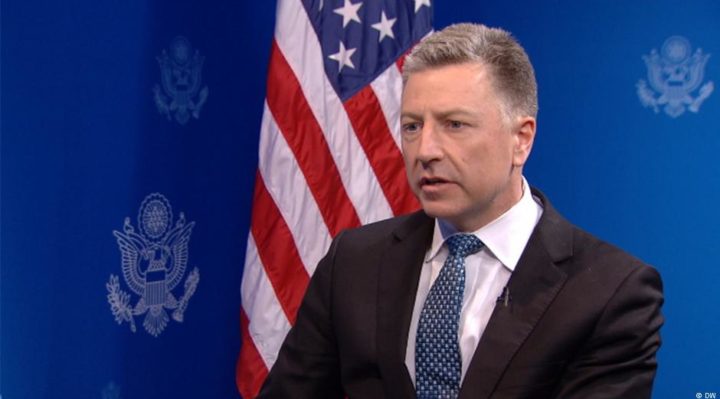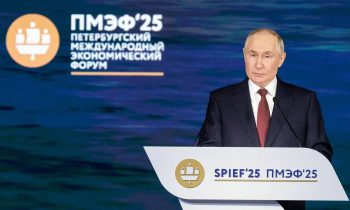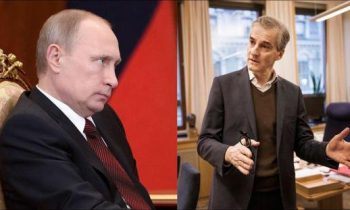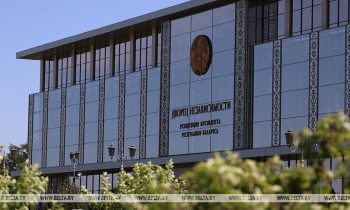Russia has amassed “significant military capacity” on Ukraine’s borders, a top U.S. diplomat confirmed Monday amid fears Russia has its eyes on another piece of the country.
“That is all true,” U.S. Special Representative to Ukraine Kurt Volker told reporters Monday.
Volker is leading State Department efforts to resolve the four-year conflict stemming from Russia’s annexation of Crimea and invasion of eastern Ukraine. Reports about a Russian military buildup have led to worries about a new “land grab” by Kremlin forces, particularly after the seizure of three Ukrainian vessels. The ships tried to sail to a port city that can only be accessed through the Kerch Strait waterway, which is controlled by Russia.
Volker said the buildup has been happening for years.
“It’s not something that has happened in the last week or two,” he told reporters. “This is something that has happened over a period of years. Russia invaded Ukraine, it took Crimea, it is occupying the Donbas, and it has, within Russia, built up significant military capacity and also in Crimea built up significant military capacity over time.”
Still, that military presence could give Russia a tactical advantage in a renewal of heavy fighting with Ukrainian forces. U.S. and regional officials have been on the watch for such an outburst for a variety of reasons, including the Kerch Strait incident and the effort to transfer control of Russian Orthodox churches in Ukraine into the hands of a new national church body.

Below is a full rush transcript of the press conference by Kurt Volker, U.S. Special Representative for Ukraine Negotiations.
Ambassador Volker: I think the key things, to remind people about some of the context here, there is an ongoing conflict in eastern Ukraine. There is violence occurring every night. There’s mortar fire, there’s sniper fire, artillery. So this just has to stop. We have been engaged, France and Germany have been engaged, Ukraine has been implementing its share of the Minsk Agreements, but we’ve frankly seen no serious movement towards a ceasefire from Russia, no withdrawal of heavy weapons, no removal of foreign fighters, no dismantling of the illegal armed groups that are there. So this conflict just continues to go on.
What we want to see, the U.S. position is, and frankly what everyone wants to see, we want to see peace. We want to see security for the population numbers there. We want to see access for humanitarian assistance because the people there are really taking it on the chin. It’s really a difficult situation for those people who are living through this conflict. The ability for people to return home. And with that, you would be able to then see the implementation of the Minsk Agreements. That means local elections, a special status for eastern Ukraine within Ukraine under its own constitution, amnesty for people who committed crimes as part of the conflict — not all crimes but for those that are part of the conflict, and local elections that would then give the opportunity to people that are there to choose who the legitimate leaders will be in the legitimate local entities.
You remember last month in November there were elections, but they were in a controlled environment, an occupied environment. They were for the two people’s republics that Russia created there, which don’t have any legitimacy within Ukraine or under the constitution or even with the local population, and it was hardly a free and fair vote.
So we’d like to see genuine local elections. That would then allow the restoration of the territory to Ukrainian sovereignty at the end of all that. So that’s what we’re there for — humanitarian assistance, peace and security, implementation of Minsk, and restoration of Ukraine’s territorial integrity.
Now that is the objectives that we have. We’ve had a number of exchanges with Russia over a year now. Over the summer and early autumn I exchanged some correspondence with my Russian counterpart to see if they were anywhere closer to being willing to come to an agreement. The answer is no, they’re not. Russia is still denying its responsibility and denying its involvement in Eastern Ukraine.
I did offer to go visit Moscow this month, and I was prepared to organize that trip when Russia, separately from this, attacked the Ukrainian Navy in the Black Sea, boarded the vessels, imprisoned the sailors, and as you know, President Trump canceled his meeting with President Putin as a result of that attack and the failure to release the sailors up to this day.
Likewise, I’m not in a position then to go to Moscow for these Minsk purposes at a time when Russia is now holding these Ukrainian sailors.
If I could just talk a little bit more about that incident and then open it up to questions.
The attack on the Ukrainian Navy is actually very serious. This is connected to a couple of things. One of them is a unilateral Russian claim of control over the Kerch Straits, which controls access to and from the Sea of Azov.
Previously we all know that Russia has claimed to have annexed Crimea, a claim that no one else accepts. Then they claim the territorial waters around Crimea as also being Russian. And then with that, they’re now claiming that the entire Kerch Strait is under unilateral Russian control, which violates the bilateral agreement with Ukraine from 2003 and allows Russia then to create a choke point for access to and from.
Ukraine tried to sail naval ships from its port in Odessa to its port in Mariupol through its own waters. Russia blocked that. When the ships turned around they were fired upon. And they were actually fired upon in international waters and boarded and taken prisoner there.
So there are legal issues we disagree with Russia on over the Kerch Strait itself and the freedom of navigation in and out of the Sea of Azov, access to these Ukrainian ports. Then there’s also the illegal action by the Russian Coast Guard to attack these vessels in open waters and pursue them and imprison them. Now they’re charging the sailors under civil code in Russia, which again is contradictory to all of the international arrangements where a foreign military force acting in its official capacity should not be subject to that, but under some kind of laws of war. Technically, these would be prisoners of war, if that’s the way Russia wanted to pursue it.
So there are a lot of things that are wrong with this.
The significance, however, is that this is a new escalation by Russia in its conflict against Ukraine and it was done openly by Russia. It’s not hiding behind proxies in the Donbas this time, it’s doing it openly. It’s something I think everyone in Europe is deeply concerned about.
That’s why I’m in Brussels today, I wanted to have meetings with EU counterparts. I’ll be meeting with Belgium bilaterally. I also have some meetings at NATO to hear from our friends and our allies what their thoughts are, how they view the most recent incidents and what recommendations they have for moving forward. So I’m taking that on board.
I just have to say that already today in the meetings that I’ve had, this is an incident that clearly has raised serious concerns across Europe.
Question: President Radev has said that Europe must not become hostage to Ukraine’s internal politics and ambitions. What is your comment on this statement and the context of the disagreements among EU member states regarding actions against Russia?
Ambassador Volker: I don’t think anybody should be hostage to Ukraine’s internal politics. But they have a very robust and vibrant democracy, and they have a lot of people running for President now. There’s going to be a lot of jostling.
But what we’re talking about today has nothing to do with Ukrainian internal politics. This is about Russia’s aggression against Ukraine, Ukraine’s right to self defense, trying to reestablish peace in the Donbas and trying to deter Russia from any further aggressive acts. This is not part of Ukrainian domestic politics.
Question: Do you have any encouraging news on the fate of the Ukrainian crew members detained near the Kerch Strait? Will they be released and returned home at any time soon? What is your forecast?
Ambassador Volker: Unfortunately, I don’t have good news to report there. Many people, including in the United States, including Chancellor Merkel in Germany, including others around the continent have urged Russia to release these sailors immediately. Chancellor Merkel raised this on the telephone with President Putin just last week.
The fact, however, is that Russia has said no. They claim there is some legal process which is, by definition, not so because they’re detaining them illegally, but they’re claiming a process that will take months for them to go through. So unfortunately, it’s not looking good. However, I guess the one piece of good news is that Ukrainians can be assured that everyone, whether it’s the United States or the EU or NATO, Western Europe, everyone is urging Russia to release these sailors immediately. I certainly would hope that Russia would do so as a gesture before Christmas, but there’s no indication from Russia at this point that they’re doing that.
Question: What more must the West do to strengthen deterrence so Russia will not fuel more aggression against Ukraine?
Ambassador Volker: I think there are a couple of things. The sanctions regime I believe does have an impact on Russia. I think if we are showing that we are reacting when Russia does something such as it just did, through additional sanctions, that would be an indicator to Russia that future acts would also be met with sanctions. So I think that could add some deterrent effect there.
I also think that keeping a multinational visible presence in and around Ukraine, whether it’s in the Black Sea or in parts of Ukraine that are relatively safe, could be an additional step because it would raise the visibility of Russia’s actions compared to what we now see.
Question: One month ago at the Halifax International Security Forum, Ukrainian Foreign Minister Klimkin referred to the discussions between the U.S. and Ukraine on the potential supply of new lethal weapons to Kyiv. How are such discussions evolving in light of the Kerch Strait incident?
Ambassador Volker: What Prime Minister Klimkin was referring to is the ability of the United States to provide foreign military financing or foreign military sales to Ukraine, something that we are perfectly willing to do as we do with many other countries. We had, the day before Halifax, we had the U.S.-Ukraine Strategic Partnership Commission. That’s a full spectrum, across-the-government consultation, and that includes the Defense Department. And we had both Ukrainian national security experts and American national security experts sitting down to talk about Ukraine’s national security strategy, its defense capabilities, any gaps that are there, and how we can act to fill those gaps.
So we have on-line, moving through the Congress is a foreign military financing package of about $250 million, and we have the ability to sell additional equipment. There will be some announcements, notifications to Congress, coming up in the next couple of months about the first tranches of that and this is going to be ongoing as we see what Ukraine’s needs are and how we can provide some assistance.
Question: Do you think there is a possibility that economic sanctions against Russia will be extended over the Azov Sea clash? And what do you think about the Ukrainian call to ban Russian ships from entering European ports? Is that possible?
Ambassador Volker: Yes. Part of the discussions I had with European Union colleagues earlier today is we have a basket of sanctions in place that relate to Crimea. We have a basket that is there relating to Russia’s failure to implement the Minsk Agreements. And we talked about what should be done in the Sea of Azov.
I think the debate will be, in Europe, over whether this is a third basket or whether this is connected to Crimea. But the notion that there needs to be a response and some additional sanctions and listing of names would occur seems to be one gaining some traction and I would not be surprised at all to see that happen in the next month or two.
Question: The rebels in Donetsk recently said that Ukraine may be preparing a military offensive in the Donetsk region. They also expect the Ukrainian side to stage provocations in Mariupol in order to prolong the marshal law. Do you consider these assertions plausible?
Ambassador Volker: I think these assertions are made by pro-Russian entities in order to deflect attention away from what Russia is doing. Russia, as we know, has claimed to control now the entire Kerch Strait. It is controlling access in and out. It’s restricting the freedom of movement of vessels beyond what’s necessary just for the safe passage, and it has then attacked the Ukrainian Navy ships.
So I think that’s what Russia is up to. As a deflection, they refer to “oh, Ukraine is planning attacks or Ukraine is provoking,” when in fact this is what’s been going on.
I think it’s actually remarkable that Ukraine has been as restrained as it has. With the Ukrainian Navy, for instance, even being fired upon in the Black Sea did not fire back and create a firefight with Russia. I think that shows tremendous restraint under the circumstances. I don’t perceive that you’re going to be seeing Ukrainian attacks, but these assertions may be ways of creating some cover for possible Russian attacks, which I hope don’t occur, but I have to say it’s possible.
Question: What actions does the United States consider in order to respond to ongoing Russian aggression and deter further escalation?
Ambassador Volker: The first thing is, my very visit here today is because we want to talk with our friends in Europe, our allies — France, Germany, UK, others — to make sure that we have a well-coordinated Western response, Western position on this. It’s not in Ukraine’s interest or anyone’s interest to bilateralize a response to Russia’s attack on Ukraine into a U.S.-Russia dynamic. So we’re trying to make sure that we’re well coordinated with our European allies and partners.
Within that then, I think we have to look at the basket of sanctions, look at the basket of monitoring or some kind of deployment, for instance of a ship visit or two to the Black Sea to show presence. The British are having ship visits today and tomorrow, and I believe that a very senior member of their government will be in Odessa. We have other visitors going to Ukraine as well. So there’s a lot I think that can be done to show an increased engagement and what I would hope would be preventive actions to dissuade Russia from any further aggression.
Question: Are there plans to extend the OSCE SMM, Special Monitoring Mission, to the Azov Sea area? What has been discussed and decided at the last Normandy Format Meeting on the 11th of December?
Ambassador Volker: Two questions. On the Normandy Meeting that did take place, it was at the level of diplomatic advisors to the presidents or chancellors. It didn’t really agree or decide anything other than that they need to keep talking, which of course everyone was willing to talk. But it did not result in a release of the sailors, it did not result in a ceasefire, did not result in the winter package of humanitarian assistance moving forward. So very disappointing, in fact, that Russia is really not willing to move on anything.
Also we talked about the prospect of a UN peacekeeping mission in Eastern Ukraine to replace the Russian forces, and Russia again didn’t really engage in that.
As for the SMM, the monitoring mission under the OSCE, their mandate already says that they have the authority to operate throughout Ukraine, and that could in theory also include Ukrainian territorial waters. The issue, however, is they don’t have the capacity to do that, so it would require additional capacity for them to do so.
The other issue is that, of course, Russia is now acting in its own name here. Unlike in the Donbas where it is pretending it is not involved and pushing these proxy entities forward, in the case of the Sea of Azov, the Kerch Strait, Russia is doing this overtly, in its own name. So it’s very unlikely to have the SMM in a position where it would be overseeing or monitoring Russia’s own activities. Russia, which has say over this in the OSCE along with all the others because it’s a consensus organization, would try and block that.
Question: Considering Turkey’s geographic situation, does the United States expect any support from its NATO ally against Russia? Technical or logistical support. And what is the U.S.’ stance on Turkey’s offer to mediate talks between Russia and Ukraine?
Ambassador Volker: I think it’s good for people to engage diplomatically with all sides, to talk with Ukrainians, understand what they’re going through, understand what their needs are. If people have influence with Putin, they should try to use that influence to try to end the war. So I think that’s a perfectly reasonable thing to do.
The issue, however, has never been a lack of channels of communication with Russia or Ukraine. The issue has been Russia’s unwillingness to end the war. So if we can have some impact on that, that would be the best possible thing.
As far as the Black Sea goes, Turkey plays a critically important role. It has the longest Black Sea coastline; it has the straits going in and out. So it is critically important as an ally in that region.
We want to be respectful of Turkey’s obligations under the Montreux Convention, as Turkey is itself. We also want to work with Turkey on security in the Black Sea and on freedom of navigation.
That said, I think there are things that we should now be looking at that maybe we weren’t looking at before to increase presence in the Black Sea, whether on a bilateral basis or under new auspices. I think there is some kind of NATO exercise planned. So I think we ought to be thinking about how that can ramp up a bit. But we are very respectful of Turkey’s obligations there as well.
Question: Ambassador Cornstein was critical about the Hungarian attitude towards Ukraine at the Committee on Foreign Relations in the Parliament. What tools do you have to keep the Orban government under pressure not to block Ukraine’s partnership with NATO?
Ambassador Volker: Hungary is blocking Ukraine’s relationship with NATO at the moment, and we think that’s very unfortunate. Here you have a country that has been attacked by Russia. Russia has seized Ukrainian territory. The fighting is still going on every day in the Donbas. And they are seeking partnership and coordination, cooperation with NATO. We are unable to schedule a ministerial-level meeting with the NATO-Ukraine Commission because Hungary blocks it. Those are just the facts, and that’s very unfortunate.
There is an issue that Hungary has raised, which is respect for rights of national minorities in Ukraine. It’s a legitimate issue to raise, and it’s an issue that affects minorities all over Europe. You have Russian speakers in the Baltic states; you have Germans in South Tyrol in Italy, Austria, South Tyrol and Italy; and so forth. So there are lots of national minority issues around.
These are things that deserve serious attention. Ukraine has passed a law that requires these minorities also to learn Ukrainian. That’s a reasonable thing for people to learn the national language where they live. Hungary is insisting that they also continue to study in Hungarian. That’s also a reasonable thing. National minorities ought to be able to study in their own language. This is something that can eminently be worked out bilaterally between Ukraine and Hungary based on European principles that are well-established in other places.
I think this is an issue, but I think it’s a very solvable issue, and it is inappropriate and not seeing the forest for the trees, if you will, to hold Ukraine’s relationship with NATO hostage over the bilateral sorting out of these minority rights, which is a legitimate issue but it shouldn’t stop our ability to work with Ukraine, including at a ministerial level at NATO.
Question: Do you have information about the exchange of prisoners in the Donbas? The last big exchange took place almost a year ago. Why do you think there has been no progress on this issue?
Ambassador Volker: I was very happy to see the exchange that took place a year ago. I think that was an important step. We hoped that it would have built some confidence. In the end, it didn’t. Ukraine, I know, remains ready to engage in further prisoner exchange, and President Poroshenko has been trying to call President Putin to talk about that. Russia, at the moment, is not interested in prisoner exchanges. I think that even holding these sailors, which are even outside of that framework, they’re holding the Ukrainian Navy sailors now for a few months, and I think this is a desire of Russia to try to use them as hostages or pawns in putting political pressure on the government in Kyiv. Which is unfortunate. These are real people with real families, and there’s a willingness on the Ukrainian side to make an exchange, and I would hope that it would be done.
Question: President Poroshenko has talked about a major buildup of Russian troops and armor close to Ukraine’s borders. Can the United States confirm that this buildup has taken place? And if so, are those Russian forces still in place?
Ambassador Volker: Yes. That is all true. It’s not something that has happened in the last week or two, however. This is something that has happened over a period of years. Russia invaded Ukraine, it took Crimea, it is occupying the Donbas, and it has, within Russia, built up significant military capacity and also in Crimea built up significant military capacity over time. So it is much larger than was there before all the conflict started. It is still the case.
Question: Mr. Ambassador, despite the odds, the Italian government voted for EU sanctions against Russia. Is this a move towards European unity in respect to the Minsk Agreements?
Ambassador Volker: I would say yes, it is. I think that you have, first off, an Italian government, which has publicly said they would like to be able to lift sanctions on Russia. They want to encourage trade. They want to support small and medium businesses in Italy. And yet I think they are recognizing that the circumstances for which these sanctions were originally put in place have not changed. Russia’s still occupying Donbas. Russia is still claiming to have annexed Crimea. It is still fighting. And now on top of that, it has done new things. There was the Skripal attack in the UK, there was the attack a couple of weeks ago in the Black Sea.
So I think any reasonable government, including the Italian government, is going to look at this and say we can’t do this now. So they’re joining the EU consensus to keep these sanctions in place.
Ambassador Volker: I hope that it was very useful for your journalists. Thank you to the hub for organizing this.
Again, our interest here is to see peace restored for the people of Ukraine in the Donbas and around, and it’s unfortunate that we now find ourselves yet again at a point of possible escalation.



